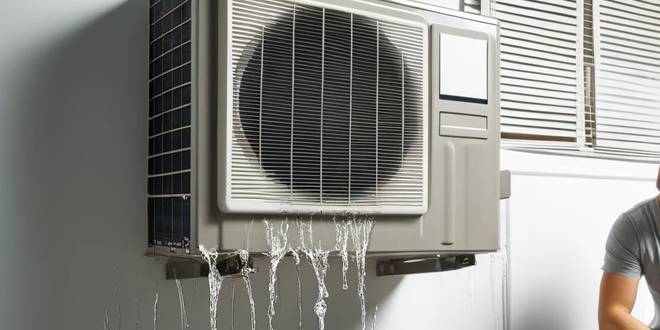
A properly functioning air conditioner is essential for maintaining comfort in your home, especially during the hot summer months. However, like any complex system, air conditioners can encounter issues, with leaks being a common and potentially serious problem. If you’ve noticed water pooling around your AC unit, it’s crucial to address the issue promptly to prevent further damage and ensure efficient operation. In this blog, we’ll explore the common causes of air conditioner leaks, offer troubleshooting tips, and provide solutions to help you keep your AC running smoothly.
Common Causes of Air Conditioner Leaks
Understanding the common causes of air conditioner leaks can help you identify and address issues more effectively. Here are some of the primary reasons why your AC unit might be leaking:
1. Clogged Drain Line
The drain line is responsible for removing condensation produced by your air conditioner. Over time, dirt, dust, and debris can accumulate and clog the line, causing water to back up and leak from the unit.
2. Dirty Air Filters
Air filters trap dust and debris from the air, preventing them from entering the system. When these filters become clogged, airflow is restricted, causing the evaporator coils to freeze. As the ice melts, it can overflow the drain pan and cause leaks.
3. Low Refrigerant Levels
Low refrigerant levels can lead to a drop in pressure within the system, causing the evaporator coils to freeze. Similar to dirty air filters, the melting ice can lead to water leaks.
4. Damaged Drain Pan
The drain pan collects condensation from the evaporator coils. If the pan is cracked or damaged, it can allow water to leak out and pool around the unit.
5. Improper Installation
If your air conditioner was not installed correctly, it could lead to various issues, including leaks. Improper leveling, incorrect sizing, and poor connections can all contribute to water leakage.
Identifying the cause of your air conditioner leak is the first step towards fixing the problem. Next, we’ll discuss how to troubleshoot these common issues.
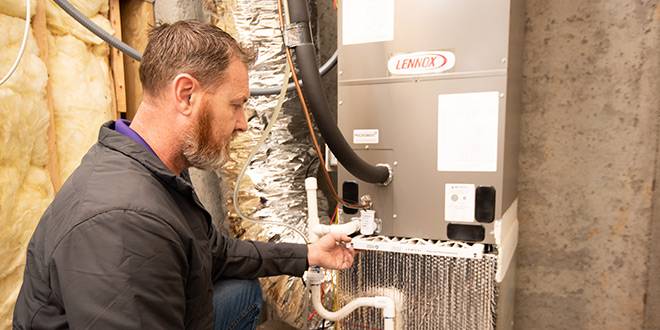
Troubleshooting Tips
Now that we’ve identified the common causes of air conditioner leaks, let’s dive into some troubleshooting tips to help you pinpoint and address these issues.
1. How to Identify a Clogged Drain Line
A clogged drain line is a frequent cause of AC leaks. To check for this:
- Locate the Drain Line: Typically, it runs from the indoor unit to the outside.
- Inspect the Line: Look for any visible clogs or blockages.
- Test the Drainage: Pour a small amount of water into the drain pan. If it doesn’t flow out through the drain line, there’s likely a clog.
2. Checking and Replacing Air Filters
Dirty air filters can cause your evaporator coils to freeze and lead to leaks. Here’s how to check them:
- Locate the Filters: Find the air filters, usually near the return air duct.
- Inspect for Dirt and Debris: Hold the filter up to the light. If you can’t see through it, it’s time for a replacement.
- Replace Regularly: Replace or clean the filters every 1-3 months, depending on usage.
3. Inspecting Refrigerant Levels
Low refrigerant can cause the evaporator coils to freeze. To check this:
- Listen for Hissing Sounds: Hissing can indicate a refrigerant leak.
- Check the Coils: Frozen coils are a sign of low refrigerant.
- Call a Professional: If you suspect low refrigerant, contact a technician to check and refill it safely.
4. Examining the Drain Pan
A damaged drain pan can cause leaks. To examine it:
- Locate the Drain Pan: It’s usually underneath the evaporator coils.
- Inspect for Cracks or Rust: Look for any visible damage.
- Replace if Necessary: If the pan is damaged, it may need to be replaced.
5. Ensuring Proper Installation
Improper installation can lead to leaks. To ensure your unit is properly installed:
- Check the Leveling: The unit should be level to ensure proper drainage.
- Verify Connections: Ensure all connections are secure and tight.
- Consult a Professional: If you suspect installation issues, it’s best to have a professional inspect your system.
By following these troubleshooting tips, you can often identify and address minor issues on your own. However, for more complex problems, it’s advisable to seek professional help.
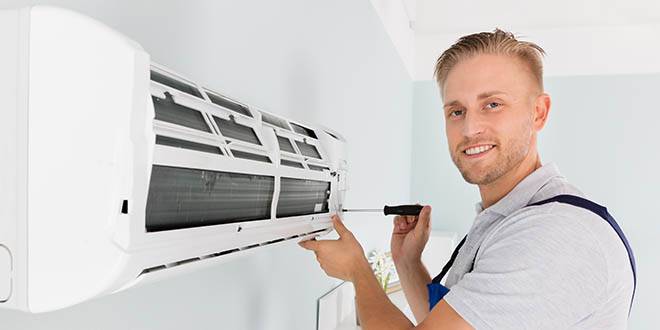
DIY Solutions for Minor Leaks
For minor air conditioner leaks, you can often implement simple DIY solutions to fix the problem and prevent further damage. Here are some steps you can take:
1. Clearing a Clogged Drain Line
A clogged drain line is a common cause of AC leaks, and clearing it is relatively straightforward:
- Turn Off the Power: Before starting any repairs, make sure the power to your AC unit is turned off.
- Locate the Drain Line: Find the drain line and the access point where you can clean it.
- Use a Wet/Dry Vacuum: Attach the vacuum to the end of the drain line and turn it on to remove any clogs.
- Flush with Vinegar: Pour a solution of one part vinegar and one part water into the drain line to clear out any remaining debris and prevent future clogs.
2. Regular Maintenance of Air Filters
Keeping your air filters clean is crucial to prevent leaks caused by frozen evaporator coils:
- Monthly Checks: Check your air filters every month and clean or replace them as needed.
- Follow Manufacturer Instructions: Refer to your AC unit’s manual for specific instructions on how to clean or replace the filters.
3. Simple Fixes for Minor Pan Damage
If your drain pan has minor cracks or damage, you can try a temporary fix:
- Seal Small Cracks: Use a water-resistant sealant to patch small cracks in the drain pan.
- Monitor for Leaks: Keep an eye on the pan to ensure the sealant holds. If the damage worsens, the pan may need to be replaced.
Implementing these DIY solutions can help you manage minor leaks and keep your air conditioner running efficiently. However, for persistent or severe leaks, professional assistance is recommended.
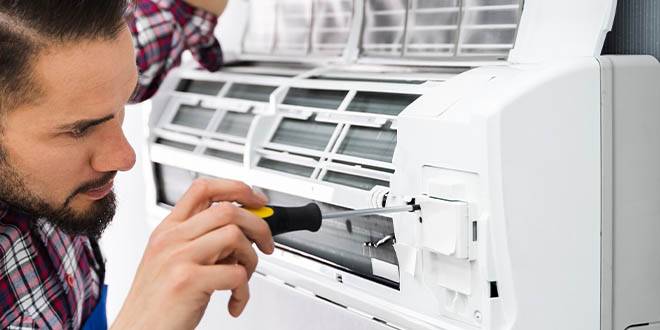
When to Call a Professional
While DIY solutions can address minor leaks, some situations require the expertise of a professional HVAC technician. Here are some scenarios where it’s best to call in the experts:
1. Persistent or Severe Leaks
If you notice that the leaks persist despite your efforts to fix them, it’s a sign that there may be a more serious underlying issue:
- Frequent Water Pooling: Continuous water accumulation around your AC unit indicates a problem that needs professional attention.
- Water Damage: Significant water damage to your home or HVAC system requires immediate professional intervention.
2. Refrigerant Issues
Handling refrigerant requires specialized knowledge and equipment:
- Low Refrigerant Levels: If your system has low refrigerant, a professional can safely check for leaks and recharge the system.
- Refrigerant Leaks: Leaks in the refrigerant lines need to be repaired by a certified technician to ensure safety and efficiency.
3. Major Damage or Installation Problems
Severe damage or improper installation can lead to complex issues that DIY fixes cannot resolve:
- Damaged Components: If major components like the evaporator coils or condenser are damaged, professional repair or replacement is necessary.
- Improper Installation: Issues stemming from incorrect installation, such as poor drainage or incorrect unit leveling, should be corrected by a professional to prevent future leaks and ensure optimal performance.
4. Benefits of Professional Inspection and Repair
Hiring a professional offers several advantages:
- Expert Diagnosis: Professionals can accurately diagnose the root cause of the leak and provide effective solutions.
- Quality Repairs: Skilled technicians use high-quality parts and materials for long-lasting repairs.
- Peace of Mind: Knowing that your system has been serviced by a qualified professional gives you confidence in its performance and reliability.
If you’re experiencing persistent or severe leaks, or if you’re unsure about handling refrigerant issues, don’t hesitate to contact Zen Air Heating & Cooling. Our experienced technicians are here to help with all your air conditioning needs.
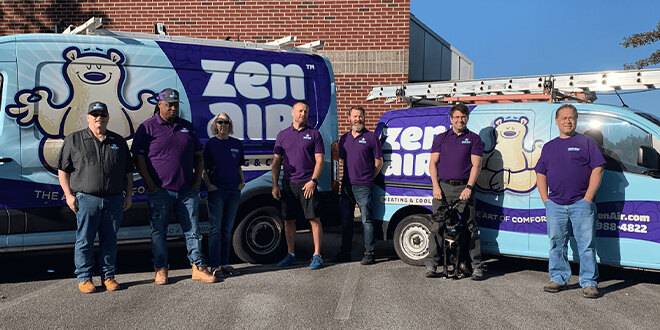
Preventive Measures
Preventing air conditioner leaks is easier than dealing with the consequences of a malfunctioning unit. Here are some proactive steps you can take to keep your AC in top condition and avoid leaks:
1. Regular Maintenance Schedule
Regular maintenance is crucial for the longevity and efficiency of your air conditioner:
- Bi-Annual Inspections: Schedule professional inspections at least twice a year to ensure your system is functioning properly.
- Club Zen Maintenance Membership: Consider joining our Club Zen Maintenance Membership for annual inspections, discounted services, priority scheduling, and emergency service.
2. Importance of Professional Inspections
Professional inspections can identify potential issues before they become major problems:
- Comprehensive Checkups: Technicians will check all components of your system, including refrigerant levels, drain lines, and filters.
- Preventive Repairs: Addressing small issues early can prevent costly repairs down the line.
3. Tips for Keeping Your AC in Top Condition
In addition to professional maintenance, here are some tips to keep your AC running smoothly:
- Clean and Replace Filters Regularly: Clean or replace your air filters every 1-3 months to ensure proper airflow and prevent frozen coils.
- Clear the Area Around the Unit: Ensure there are no obstructions around your outdoor unit to allow for proper airflow.
- Check the Drain Line: Periodically inspect the drain line for clogs and clear it as needed.
- Monitor Refrigerant Levels: Keep an eye on refrigerant levels and call a professional if you notice any issues.
By following these preventive measures, you can reduce the risk of leaks and ensure your air conditioner operates efficiently.
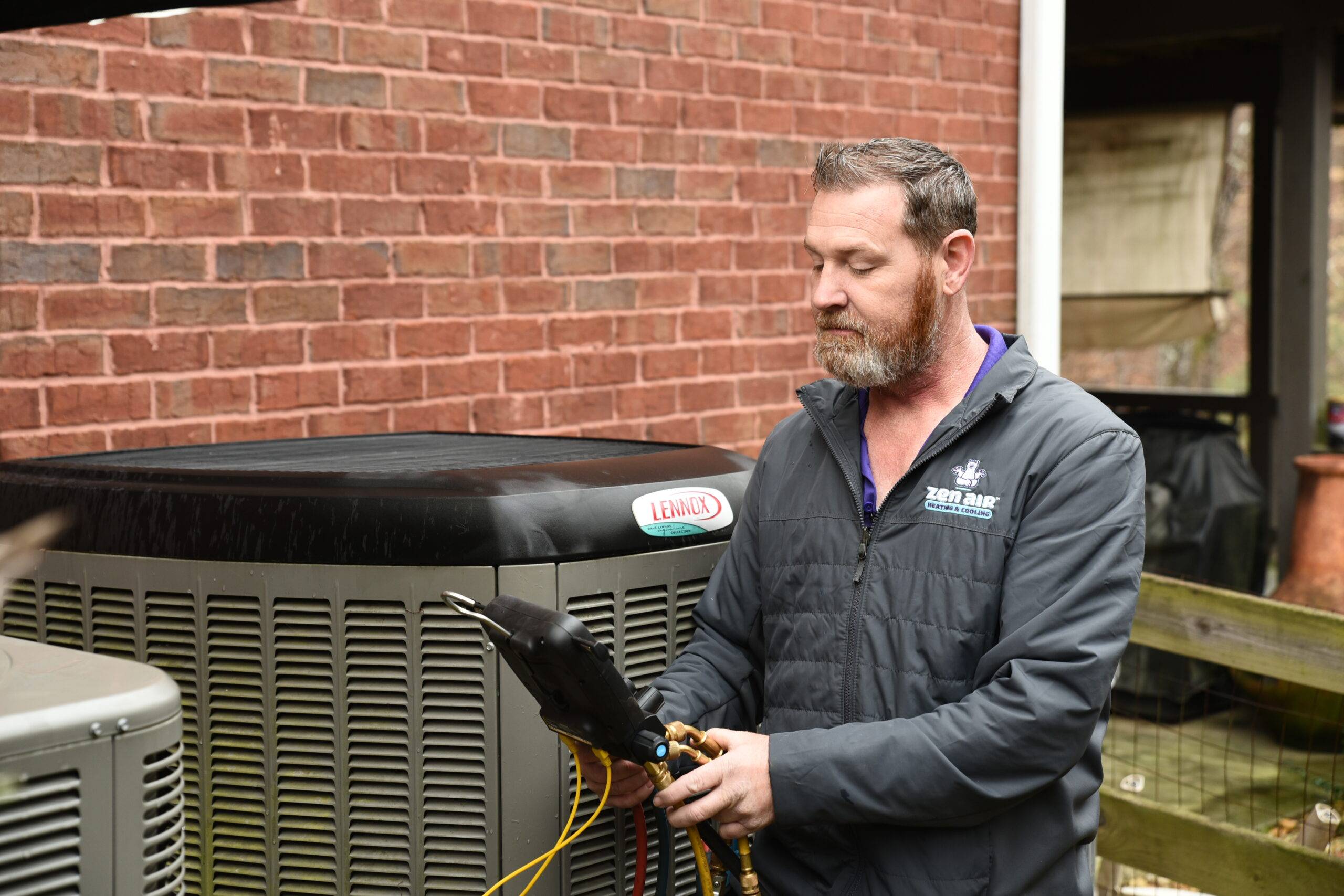
Conclusion
Air conditioner leaks can be a frustrating and potentially damaging issue for homeowners. By understanding the common causes, troubleshooting the problems, and implementing DIY solutions, you can often address minor leaks on your own. However, for persistent or severe leaks, it’s important to seek professional help to ensure your system is repaired correctly and safely.
Regular maintenance and preventive measures are key to keeping your air conditioner in top condition and avoiding future leaks. Scheduling bi-annual inspections, keeping air filters clean, and monitoring refrigerant levels can make a significant difference in your system’s performance and longevity.
If you’re experiencing issues with your air conditioner or want to ensure it remains in optimal working condition, don’t hesitate to reach out to Zen Air Heating & Cooling. Our experienced technicians are ready to help with all your air conditioning needs, from maintenance and repair to installation. Remember, when it comes to your comfort, we’re here to ensure you enjoy a cool and leak-free home.
Thank you for reading, and stay comfortable with Zen Air Heating & Cooling!🌬️



